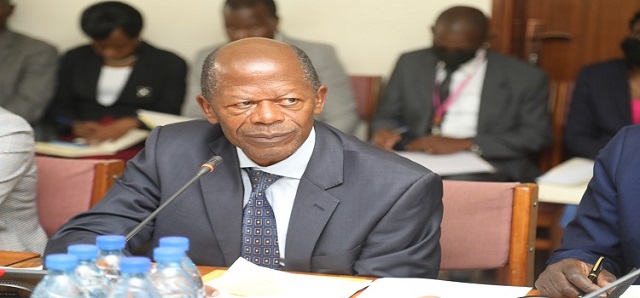
Kampala, Uganda | THE INDEPENDENT | Re-voting of Shs80 billion has stalled construction of 15 seed secondary schools under the Uganda Inter-Government Fiscal Transfer Programme II (UGFIT), according to officials from the Ministry of Education and Sports.
The officials led by the Minister of State for Education and Sports (Higher Education), John Chrysostom Muyingo were appearing before the Committee on National Economy to report on the performance of UGFIT on Thursday, 02 March 2023.
The Acting Principal Economist at the MoES, Derrick Namisi told the lawmakers that the Shs80 billion was returned to the Consolidated Fund in the 2021/2022 financial year, and up to-date, it has not been returned.
“When this money is returned to the Consolidated Fund at the end of the financial year, most of it is only returned to the local governments either in the third or fourth quarter of the next financial year,” said Namisi.
He called for the expeditious return of the funds, saying that contractors are on site but they cannot carry on with works due to no funds.
“If this money could be returned, we believe most of it will be absorbed. It was returned because there was lack of clarification, we awaited guidance which was later given,” said Namisi.
The districts affected include, Ntungamo, Maracha, Amuru, Budaka, Gulu, Kubuku, Manafwa and Omoro. Others include Kyenjojo, Namisindwa, Kanungu, Isingiro, Nwoya and Kyegegwa.
Members of Parliament however, said that construction works of the seed schools in the named districts have stalled because the ministry imposed contractors on the local leaders.
Molly Lematia, Maracha East County MP said that contractors are selected by the ministry and sent to the local governments.
“This leads to conflict between contractors and the local government leaders, thereby stalling construction works,” she said.
Lyantonde District Woman MP, Pauline Kemirembe blamed the Education Ministry for failing to closely vet the capacity of contractors.
“The relationship between contractors and the local government leaders is not good. The problem is not with local governments, it goes back to the ministry,” Kyako said.
The legislators advised that contracts of contractors who fail to deliver should be terminated and competent ones hired.
Muyingo however, said that procurement of contractors and expenditure of the funds is done at local government level.
“It is wrong to say that the ministry benefits from contractors. We need you to tell us in case contractors become big headed so that we address the matter,” said Muyingo.
The Permanent Secretary, Ketty Lamaro said that it is difficult and costly to terminate a contract.
“You terminate, you go into litigation and works stall further and more costs incurred. Many times it is better to move with the contractor. It is such incidences that drove President Museveni to give a directive to use engineers from the army and this is so far going well,” she said.
Government in collaboration with the World Bank have been implementing the Shs1.4 trillion UGIFT programme since 2018/2019 financial year.
The programme was designed to support the Ministries of Education and Health to improve service delivery at the local government level through construction of public secondary schools and health centre IIIs in each sub-county.
The ministry reported that construction of the first batch of the 117 seed secondary schools commenced in 2018 and 88 have been completed with 62 already commissioned.
 The Independent Uganda: You get the Truth we Pay the Price
The Independent Uganda: You get the Truth we Pay the Price



